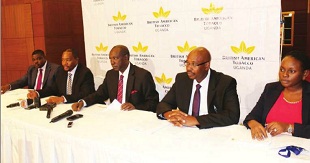Top bosses warn government on illicit tobacco, which accounts for 20% of market
By Patrick Kagenda
In recent years, shareholders of British American Tobacco Uganda (BATU) have come to always look forward to the first two weeks of May, the period when the company has traditionally held its annual general meeting. It has now become a guarantee that they must hear some really good news that sends them smiling to the bank. The AGM on May 13 was not any different. They were told that they will share a total dividend of Shs 20.3 billion or Shs 413 per share for the year ended December 2015.
This is definitely lower than the Shs 36.8 billion dividends they got a year earlier in 2014 (Shs 748 per share), but they will still not worry too much given the difficult economic environment during which many companies have opted not to pay a dividend at all. For example, Stanbic Bank Uganda, the second largest local company on the stock exchange by market capitalisation, will pay shareholders a dividend of less than a shilling for 2015.

Officials said the company experienced a significant impact from the depreciation of the shilling against the US Dollar coupled with inflation that was significantly higher in 2015 compared to 2014, thus eroding its profitability by Shs 16.4 bn compared to the previous year. Operating profit also dropped to Shs 37.3bn in 2015 from Shs 54.8bn in 2014. Despite the unfriendly economic situation, the company managed to sell all its leaf during the year under review and paid tax to government amounting to Shs 71bn mark in 2015 up from Shs 69 bn in 2014.
Additionally, net revenue dropped to Shs 179bn in 2015 from Shs 270bn in 2014. Managing Director Dadson Mwaura said that despite the hard economic times, they managed to grow cigarette revenue by 6% in 2015 to Shs 70bn from Shs 64bn in 2014 mainly due to price increases on some of BATU’s major brands. The growth was premised on the price increases on some of BAT`s major brands. Also, market share has grown to about 80% today, which is a 4% growth when compared to 2014. However, the Company’s total revenues were 26% lower as a result of lower leaf export volumes following the discontinuation of their leaf business in 2014. Cigarette sales volumes were also impacted by the 29% increase in Excise duty which took effect in July 2015 to which the company responded by increasing prices and cutting operating costs.
Mwaura noted that Sportsman, the company’s flagship brand, has continued to grow and now delivers about 50% of the company revenue. Paul Claude Sine, the company’s finance director, said the depreciation of the shilling in 2015, which was significant, had an impact on operations as foreign-based costs. “However, we had leaf revenues in 2015 to mitigate part of that. When you look at our accounts on the financing costs, they actually went up because of the foreign exchange differences. The healthy thing about that is that we closed the year with no bank loans at all, we are now on a solid footing in 2016,” he said.
BAT owners are set to earn shs413 per share in 2015, down from shs748per share earned in the previous year, as the hard economic times hit the industry.
Elly Karuhanga, the BAT board chairman, decried the large volume of illicit tobacco on the market. “We think 20% of cigarettes sold on the market are all smuggled making government lose revenue of over Shs 27 bn. If the government could stop this illicit trade, it could be healthy for the government. You realize we made profit of Shs 20bn and paid government Shs 71bn in taxes. So if 20% illicit trade in cigarettes is going on, Shs 27bn is the estimated loss in taxes to government.” Economist Fred Muhumuza while commenting on the BAT performance, said: “When you look at their cost structure, BAT is no longer directly involved in the production of the green leaf. This change in the production process denies them some profit, which has gone to the company they outsourced to supply them with green leaf.” BATU, which is listed on the Uganda Securities Exchange, remains the best-priced stock on the bourse at the moment, trading at an average of Shs 30,000 per share, up from Shs 8,500 at the end of 2014. The company is a member of British American Tobacco Group, the world’s second-largest quoted tobacco group by global market share, with brands sold in more than 180 markets.
 The Independent Uganda: You get the Truth we Pay the Price
The Independent Uganda: You get the Truth we Pay the Price



